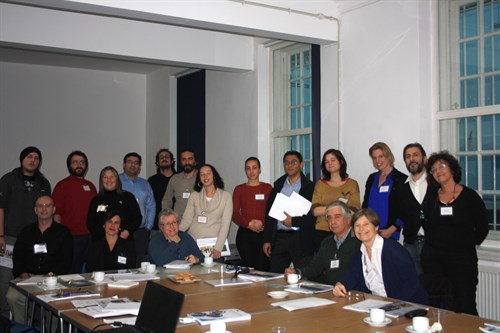At Rinova we have always believed that there is ‘something intrinsic’ – and something particularly effective – about the way that the arts motivates learning in those who have been alienated or excluded by more traditional education.
We were therefore delighted to win a new, exciting international development project – ARCO – to explore this further, which we kicked off at WAC Performing Arts and Media College this week.
ARCO is a two-year Leonardo da Vinci project, funded under the ‘Transfer of Innovation’ theme. For over 30 years WAC has pioneered the use of artistic and cultural non-formal learning to foster social and economic inclusion for disadvantaged young people, and it has operated Arco Plus and Arco Junior for some 10 of those.
WAC was successful in the UK in attracting investment from the UK’s Learning and Skills Improvement Service (LSIS) to capture this practice, and worked with Rinova in 2010-11 to develop an innovative Trainers Tookit. It is this Tookit, and the Arco approaches and practices contained in it, that will be transferred, tested and adapted in the new Leonardo partnership, in which WAC and Rinova are joined by:
- New Arts Arnhem, Netherlands
- MuLab Cultural Association, Rome, Italy
- Hope for Children UNCRC Policy Centre, Cyprus
- MetroLab Association, Malaga, Spain
- Questao Assocation for Youth Inclusion, Portugal
The project will have its own website and a dedicated Twitter account, which will be launched in the new year.
Celia Greenwood, CEO at WAC commented:”We are delighted to be working in this new ARCO partnership funded by the Lifelong Learning Programme of the European Union – which is a beacon that is investing in innovation in skills, learning and employabilty. We have been very successful with our employability programmes in the past – we topped the London Employability Ratings tables – but the imminent demise of LSIS and the shift to managed payment by results schemes in the UK makes risk-taking and innovation even more difficult – at a time when they have rarely been needed more.”
Richard Parkes of Rinova said: The Rinova consortium was formed to bring together organisations that have been effective at using creativity and inspiration to bring young people NEET back into learning and to progress in the jobs market. The decision to replace Key Skills in Apprenticeships with the narrower Functional Skills risks losing sight of the very transferable skills that are always reported as being so valued by employers. However, by investing in this approach through programmes such as ARCO and doing ‘what works’ despite everything, we’re having great success with our Apprenticeships, and our youth skills and employability programmes such as ASPIRE-2.be.”

Pictured above: ARCO partners at the transnational project launch meeting held at WAC’s Hampstead Town Hall on the 10th and 11th December 2012

This project has been funded with support from the European Commission. This communication reflects the views only of the author, and the Commission cannot be held responsible for any use which may be made of the information contained therein


